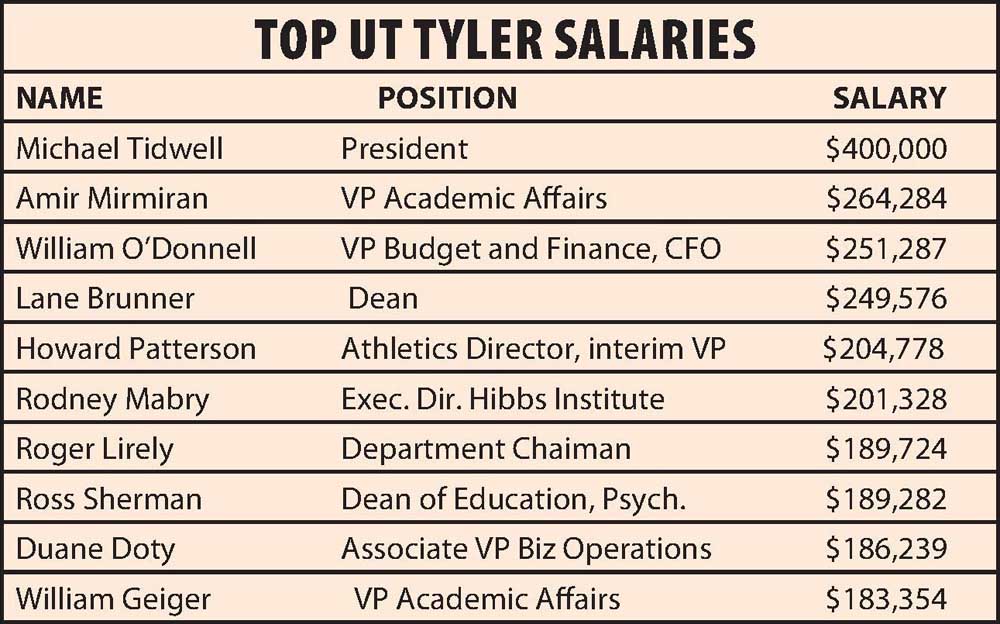A look at the top salaries at the University of Texas at Tyler
Published 10:20 am Sunday, December 9, 2018

- A look at the top salaries at the University of Texas at Tyler
In the final installment of a five-part series on government salaries, the Tyler Morning Telegraph took a look at the salaries at the University of Texas at Tyler.
UT Tyler is a public, comprehensive campus offering 80 bachelor’s degree programs, plus master’s degree programs and doctoral degree programs.
Trending
The university enrolls more than 10,000 students, largely undergraduates. Its annual budget is $165.6 million for fiscal year 2019.
UT Tyler is part of the UT System, the statewide public university system that also oversees 13 other campuses, including universities and hospitals. A board of regents appointed by the governor of Texas makes decisions for the UT System.
Through a request under the Texas Public Information Act, the Tyler Morning Telegraph obtained actual pay of all UT Tyler employees — fulltime and part-time — who received pay in the 2018 fiscal year, which ended Sept. 30.
The 2,654 employees include anyone who made a paycheck that year. There were 17 vice presidents, 279 professors, 185 adjunct professors and instructors, 672 undergraduate and graduate assistants, 90 work-study students, and 22 athletic coaches, among other employees.
WHAT THE NUMBERS SHOW
One hundred thirty-eight UT Tyler employees, about 5 percent of the total, made $100,000 or more in fiscal year 2018, according to the data.
Trending
The highest-paid person at UT Tyler is President Michael Tidwell, whose pay is set by the umbrella UT System, not locally. His base salary was
$400,000 in fiscal year 2018.
No. 2 was Amir Mirmiran, the provost, vice president for academic affairs and chief administrative officer, who made $263,264 in base pay plus $1,020 in other compensation, for a total of $264,284.
No. 3 was William O’Donnell, the vice president for budget and finance and chief financial officer, who made a base salary of $250,707, plus $580 in other compensation, for a total of $251,287.
They were followed by Lane Brunner, a dean, who made a total of $249,576; Howard Patterson, the athletics director and interim vice president for student success, at $204,778; and Rodney Mabry, the executive director of the Hibbs Institute for Business and Economic Research, at $201,328.
No. 7 was Roger Lirely, the chairman of the Department of Accounting, Finance, and Business Law, at $189,724; No. 8 was Ross Sherman, the dean of the School of Education and Psychology, at $189,282; No. 9 was Duane Doty, a professor and the associate vice president for business operations, at $186,239; and No. 10 was William Geiger, the vice president of academic affairs and the dean of graduate studies, at $183,354.
The best available data on other higher education executives is from the Texas Tribune’s online salary explorer. A review of that information shows that Tidwell’s pay is on the lower end of five other universities within the UT System and less than half of the system chancellor’s pay.
Sandra Woodley, the president of UT Permian Basin, made $425,000 as of 2017; Diana Natalicio, the president of UT El Paso made $426,755 as of 2016; and Vistasp Karbhari, the president of UT Arlington, made $485,000 as of 2016.
Richard Benson, the president of UT Dallas, made $525,000 as of 2017; Gregory Fenves, president of the flagship UT Austin, made $750,000 as of 2017; and William McRaven, then-chancellor of the UT System, made $1.2 million as of 2017. Data was not available for the presidents of UT Rio Grande Valley or UT San Antonio.
“In order to attract and to retain effective, highly skilled and committed individuals to serve as presidents of UT institutions, it is the policy of the UT System to offer competitive levels of compensation,” Karen Adler, a spokeswoman for the UT System, said in a statement.
“The base salary rate for each president is set by the UT System Board of Regents following a review of national compensation survey data for respective peer institutions and takes into account the extraordinary responsibilities and impact of a university president,” Adler said.
The average pay for the 2,654 employees at UT Tyler in fiscal year 2018 was $25,569, and the median was $6,912, according to the Tyler Morning Telegraph analysis. The middle half of employees made between $2,055 and $40,795.
The median pay for UT Tyler employees is skewed lower than many other government salaries, such as pay at Tyler Junior College, because of the high number of adjunct employees, work-study students and teaching assistants.
The university accounts for salaries through different funding sources, and lists its salaries based on different duties, such as professors who work in the summer in addition to the school year. Employee salaries varied based on their duties.
Vice presidents made an average of $143,825 when all of their job titles were included; professors made an average of $91,407 including all their job titles; and athletic coaches made an average of $42,003 including all their job titles.
Pay for people with the title of adjunct professors or instructors made anywhere from $550 total to $60,667 total based on any other job duties. Work-study students made between $45 and $9,850. People with the title of “assistant,” which included teaching assistants, made between $13 and $33,692, depending on other responsibilities.
SETTING PAY AT UT TYLER
Lucas Roebuck, the chief communications officer for UT Tyler, said the university’s human resources department generally sets pay ranges for employees.
The department uses data from the College and University Professional Association for Human Resources, often called CUPA, to set the range based on what similar universities pay while taking into account Tyler’s cost of living.
The managers use the range to determine whether a person should be on the higher or lower end of the pay scale. However, managers who want to pay lower or higher than the numbers in the suggested range can seek approval from human resources to do so, Roebuck said.
Roebuck said the university tries to make sure that full-time faculty teach the majority of the classes instead of adjunct instructors. Those faculty salaries are set differently from other staff salaries.
“Faculty salaries are determined by the Office of Academic Affairs based on a number of factors, including specialization, terminal degree, research history, and (the College and University Professional Association for Human Resources) comparisons with peer institutions,” Roebuck said in a written statement.
“We work very hard to recruit the best faculty to Tyler,” he said. “We recruit Ivy League grads, professors from (high-level research) schools, all who bring specific expertise in their discipline, and many who have long track records of teaching excellence as well.”
“In comparison to our University of Texas System peers and our aspirant peers, like Cal State Long Beach, SUNY Oswego and University of Mary Washington, most of our salaries are average. Obviously, quality of life in Tyler helps in our recruiting,” he said.
Roebuck said there is no automatic cost of living adjustment for employees. He said university managers award merit raises during years when there is enough money in the budget, and the average merit raise is about 2 percent for an employee with excellent performance.
“Additionally, faculty have an opportunity for raises when they apply for rank promotion, usually from assistant professor to associate professor, and then from associate professor to full professor,” he said. “Only after a thorough review process following years of distinguished service and research excellence will a faculty member become a full professor.”
In terms of the number of administrators, Roebuck said the university has the right number. He said the university is always looking for ways to be more efficient, but also looks for ways to help the university improve and be a leader in higher education East Texas.
“It’s a fair question to keep asking, ‘Can we lower the overhead?’ because administration is overhead and we want to reduce that,” he said. “On the other hand we are looking to innovate, to raise our profile, and that takes a little horsepower, human horsepower.”
TWITTER AND INSTAGRAM: @_erinmansfield
“We work very hard to recruit the best faculty to Tyler. We recruit Ivy League grads, professors from (highlevel research) schools, all who bring specific expertise in their discipline and many who have long track records of teaching excellence as well.”
LUCAS ROEBUCK, UT TYLER CHIEF COMMUNICATIONS OFFICER






